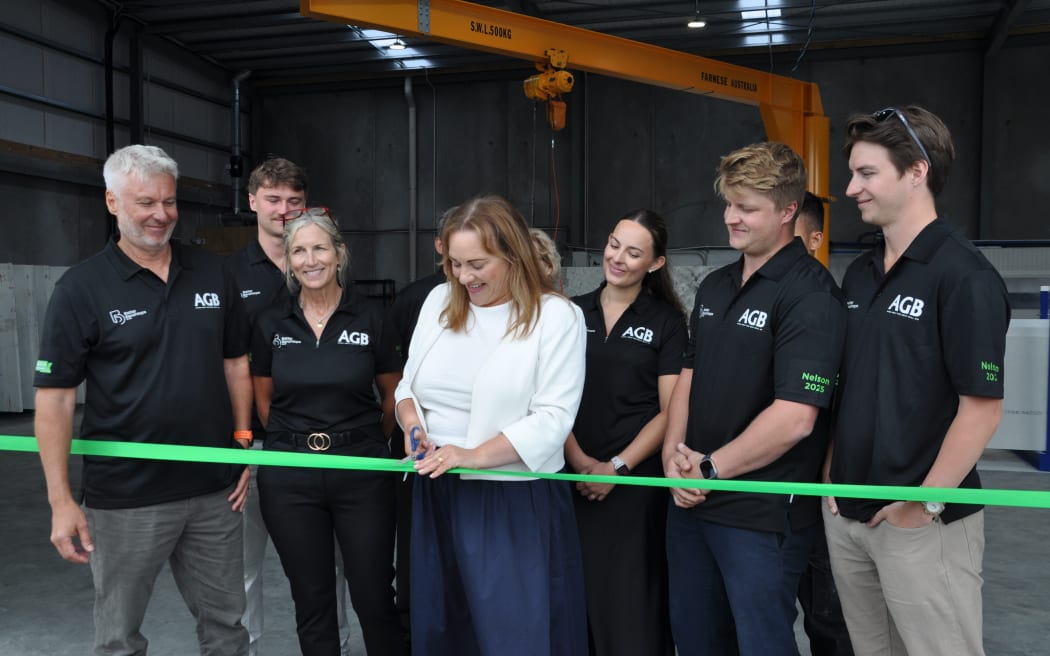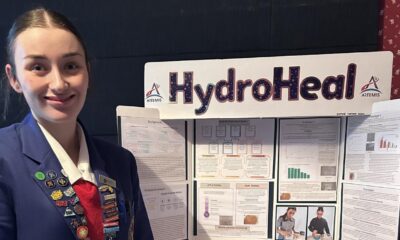Business
New Zealand Manufacturer Advocates for Zero-Silica Engineered Stone

A New Zealand stone fabricator, AGB Stone, is urging manufacturers and consumers to discontinue the use of potentially hazardous crystalline-silica engineered stone. Approximately 1,000 workers in New Zealand have been exposed to high levels of respirable crystalline-silica (RCS) dust while handling engineered stone slabs over the past 15 years. With the product already banned in Australia, AGB Stone has transitioned to a zero-silica engineered stone and is calling on others in the industry to follow suit.
Established for 18 years, AGB Stone recently opened New Zealand’s first factory dedicated to zero-crystalline-silica engineered stone in Tasman. Co-owner Cam Paranthoiene stated that the decision to switch was influenced by the health implications observed in Australia. “We went to investigate zero-silica products commercially because we lost a big contract, but once we found out the impact on the staff in Australia, we knew that we had to do the same thing for our staff here,” he explained. Currently, zero-silica products account for 60 percent of AGB’s orders, with plans to convert all of its factories in the future.
The risks associated with engineered stone are significant. The high silica content in these materials exposes workers to RCS dust during processes such as cutting, grinding, and polishing. Such exposure can lead to accelerated silicosis, a progressive respiratory disease. According to ACC, since 2019, the Ministry of Health, WorkSafe, and ACC have advised individuals who worked with engineered stone for six months or longer in the last decade to seek health checks. As of August 15, 2023, there have been 253 claims for accelerated silicosis since the assessment pathway was initiated in September 2020. Of those claims, only 30 were accepted for coverage.
Research published in March by the Public Health Communication Centre indicated that based on Australian data, around 250 of the 1,000 New Zealand workers who fabricated engineered stone over the last 15 years are likely to develop silica-related diseases. The New Zealand government is currently reviewing options to address the health risks linked to engineered stone. Earlier this year, the Ministry of Business, Innovation and Employment (MBIE) consulted on various control measures, including a potential ban. Meanwhile, WorkSafe NZ has already reduced the workplace exposure standard for silica dust.
Many organisations, including the Employers and Manufacturers’ Association, the Council of Trade Unions, and MinEx, have advocated for a ban on engineered stone due to health concerns. Nita Zodgekar, the MBIE sectoral health and safety policy manager, noted that 68 submissions were received during public consultations on the issue. Approximately 80,000 workers are believed to experience probable high levels of exposure to RCS across various industries, including construction and demolition.
In a statement regarding the government’s approach, Brooke van Velden, Minister for Workplace Relations and Safety, emphasized the need for evidence-based decision-making regarding engineered stone. Initiatives have been launched to promote better risk management practices, and inspections of workplaces fabricating engineered stone have been ongoing since 2019. Van Velden mentioned that businesses are becoming increasingly aware of RCS exposure risks and are managing these risks more effectively.
Paranthoiene called for greater support from industry leaders for safer zero-silica products, despite the absence of a ban in New Zealand. AGB Stone has spent the last fifteen years implementing safer practices to mitigate silicosis risks and phased out high-crystalline silica products in 2023. “If you’re a good fabricator with really good disciplined systems and controls, you’re okay, but not everyone is,” he remarked. “We must look at this as being about the lowest common denominator in our industry.”
Working in collaboration with kitchen hardware supplier Archant, AGB Stone has focused on sourcing zero-silica stone products. Sefton Clare, sales director at Archant, stated that their sales are now exclusively of zero-silica products. “We’re just seeing the volumes of the zero-silica product increase going from strength to strength; it’s really a no-brainer,” he noted. Clare also expressed the view that New Zealand should follow Australia’s lead and ban engineered stone, stating, “One person with silicosis is one too many.”
Nelson MP Rachel Boyack officially opened the new factory in Tasman, commending the industry’s proactive stance in addressing a significant health issue. “We know that these products can cause silicosis for workers, and that’s devastating for them,” she remarked, highlighting the importance of the new factory as a strong market signal. Boyack underscored the necessity for increased government action to ensure worker safety and urged consumers to take responsibility for their choices by opting for products with low or zero silica content.
As discussions continue regarding the future of engineered stone in New Zealand, the push for safer alternatives is gaining momentum, with AGB Stone leading the charge for change within the industry.
-

 Sports2 months ago
Sports2 months agoNetball New Zealand Stands Down Dame Noeline Taurua for Series
-

 Entertainment2 months ago
Entertainment2 months agoTributes Pour In for Lachlan Rofe, Reality Star, Dead at 47
-

 Entertainment1 month ago
Entertainment1 month agoNew ‘Maverick’ Chaser Joins Beat the Chasers Season Finale
-

 Sports2 weeks ago
Sports2 weeks agoEli Katoa Rushed to Hospital After Sideline Incident During Match
-

 Sports2 months ago
Sports2 months agoSilver Ferns Legend Laura Langman Criticizes Team’s Attitude
-

 Politics1 month ago
Politics1 month agoNetball NZ Calls for Respect Amid Dame Taurua’s Standoff
-

 Entertainment3 months ago
Entertainment3 months agoKhloe Kardashian Embraces Innovative Stem Cell Therapy in Mexico
-

 Sports2 weeks ago
Sports2 weeks agoJamie Melham Triumphs Over Husband Ben in Melbourne Cup Victory
-

 World4 months ago
World4 months agoPolice Arrest Multiple Individuals During Funeral for Zain Taikato-Fox
-

 Sports3 months ago
Sports3 months agoGaël Monfils Set to Defend ASB Classic Title in January 2026
-

 Entertainment2 months ago
Entertainment2 months agoTyson Fury’s Daughter Venezuela Gets Engaged at Birthday Bash
-

 Sports2 months ago
Sports2 months agoHeather McMahan Steps Down as Ryder Cup Host After Controversy




















